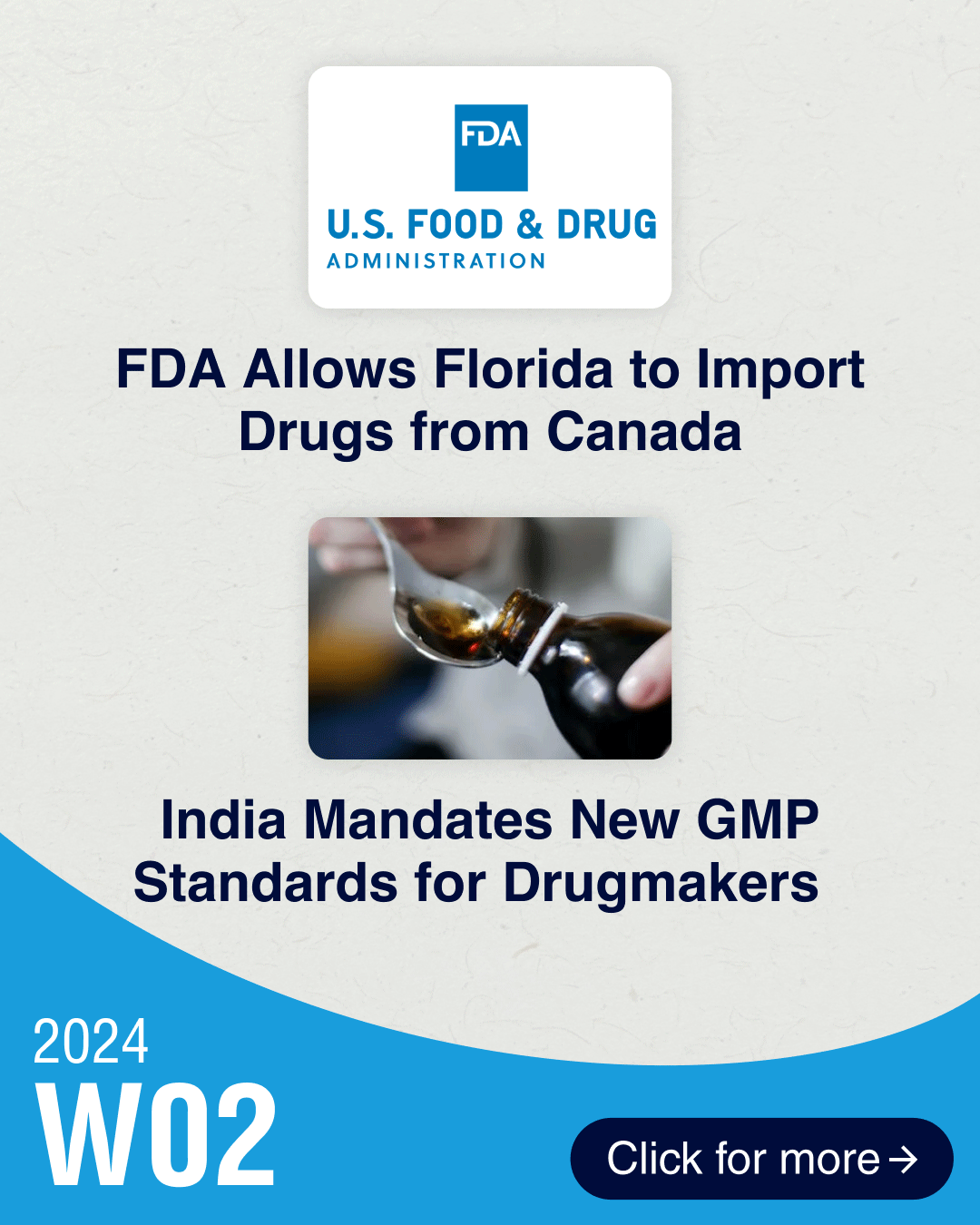
By PharmaCompass
2024-01-11
Impressions: 1,343
In this week’s Phispers, the United States Food and Drug Administration (FDA) has allowed the state of Florida to import prescription drugs from Canada. In the aftermath of deaths in The Gambia, Uzbekistan and Cameroon in 2022 and 2023 that were linked to India-manufactured cough syrups, the Indian government has announced new manufacturing standards for drugmakers.
In the ever-expanding obesity market, Eli Lilly has launched a website and Novo Nordisk has announced strategic collaborations with two research biotech firms to come up with the next generation of glucagon-like peptide 1 (GLP-1) products. Meanwhile, Merck has said its GLP-1 strategy is to come up with treatments with benefits beyond weight loss.
The M&A space saw yet another acquisition related to antibody-drug conjugates (ADCs) — Johnson & Johnson bought Ambrx Biopharma for about US$ 2 billion. AbbVie has signed two deals with Umoja Biopharma for up to US$ 1.44 billion for novel cancer therapies. And, GSK has snapped up asthma drugmaker Aiolos Bio for US$ 1 billion. Moreover, there is buzz around Novartis looking to buy San Francisco-based Cytokinetics that may result in an over US$ 10 billion deal.
Florida becomes first US state to get FDA okay to import drugs from Canada
In a major policy shift, FDA has okayed Florida’s request to import prescription drugs from Canada, citing a 2021 Joe Biden executive order. The Sunshine State estimates the move could save taxpayers US$ 150 million a year. Drug prices in the US are among the highest in the world and over two times more than that of industrialized nations where government healthcare systems negotiate prices of prescription meds. The US drug industry has relentlessly opposed such imports and has termed the approval granted to Florida as a "reckless decision". This policy measure opens the door for other states to follow suit. In fact, FDA said it is committed to helping them do so.
Lilly launches website for ordering medicines, connecting with telehealth firms
Eli Lilly has launched a website — LillyDirect — where users can directly order its products including weight loss med Zepbound. LillyDirect will also connect patients with independent telehealth providers. This move comes on the back of companies like WeightWatchers and Ro offering weight loss drugs on similar platforms, and analysts say the “model is ideal for obesity medications and drives uptake.”
Novo in strategic deals with two biotechs: Novo Nordisk has announced strategic collaborations with two research biotech firms – Omega Therapeutics and Cellarity Inc – to stay ahead of the curve. The deal could lead to next-generation treatments for people living with obesity and a type of liver disease known as MASH (short for metabolic dysfunction-associated steatohepatitis). Moreover, a study of data from over 1.8 million patients debunked the notion that the Danish drugmaker’s semaglutide-based drugs Ozempic and Wegovy are linked to an increase in suicidal thoughts.
Merck’s GLP-1 drugs to focus beyond weight loss: Merck CEO Robert Davis has said its strategy with GLP-1 is to come up with treatments with benefits beyond weight loss as this could make it easier to get reimbursements. The New Jersey-based drugmaker said its investigational GLP-1 drug efinopegdutide for non-alcoholic steatohepatitis (NASH), demonstrated "compelling" weight-loss benefit.
Post cough syrup deaths, India introduces new GMP standards for drugmakers
Shaken by over 141 deaths in The Gambia, Uzbekistan and Cameroon that the World Health Organization (WHO) and other authorities have linked to India-made cough syrups, the Narendra Modi government in India has set new manufacturing standards pharmaceutical companies must satisfy this year. Schedule M of the Drugs and Cosmetics Rules prescribes good manufacturing practices (GMPs) for pharmaceutical products. This schedule was revised to ensure companies “do not place patients at risk due to inadequate safety, quality or efficacy.”
Products may be marketed only after testing shows “satisfactory results”. Small companies, many of whom are heavily in debt, have asked for an extension after it was found that less than a quarter of 8,500 small drug factories in India’s US$ 50 billion pharma industry met international drug manufacturing standards set by the WHO. The move “would bring our GMP recommendations at par with global standards, especially to those of [WHO],” said the health ministry.
Novartis in talks to buy Cytokinetics for over US$ 10 billion, reports WSJ
Last month, results from a late-stage study of Cytokinetics’ experimental heart disease drug — aficamten — revealed that the drug had met its main goal, making it a potential competitor to Bristol Myers Squibb’s Camzyos (mavacamten). And now, drugmakers are reportedly lining up to buy the company. According to a report published in the Wall Street Journal, Novartis is poised to beat AstraZeneca and Johnson & Johnson and acquire Cytokinetics for well over US$ 10 billion. However, Novartis CEO Vasant Narasimhan is holding his cards close and declined to comment on the news report. He said the Swiss drugmaker’s strategy is to “focus on sub US$ 5 billion assets.
J&J boosts cancer pipeline, enters ADC space with US$ 2 bn Ambrx buyout
One of the major deals announced at the annual J.P. Morgan Healthcare Conference was Johnson & Johnson’s acquisition of ADC drug developer Ambrx Biopharma for about US$ 2 billion. This makes J&J the latest drugmaker to bet on ADCs after Pfizer, AbbVie and Merck. Ambrx’s portfolio includes experimental drugs such as its lead candidate ARX517 for metastatic castration-resistant prostate cancer (mCRPC) and ARX788 for metastatic HER2+ breast cancer.
AbbVie inks CAR-T deals with Umoja: AbbVie has signed two in-situ CAR-T deals with Seattle-based Umoja Biopharma for up to US$ 1.44 billion plus tiered royalties. Umoja’s VivoVec platform takes a novel approach that enables T cells in the body to manufacture their own cancer-fighting CAR-T cells in vivo, i.e. within the patient’s body. Traditionally, CAR-T approaches involve extracting the patients’ cells or using donor cells, which are then modified and delivered back to the patients. This new approach could potentially eliminate numerous challenges.
GSK buys Aiolos for up to US$ 1.4 billion: GSK has snapped up asthma drugmaker Aiolos Bio for US$ 1 billion and its mid-stage-ready, long-acting antibody AIO-001 which could redefine the treatment of certain respiratory and inflammatory conditions. Aiolos is also entitled to US$ 400 million in milestone payments.
The PharmaCompass Newsletter – Sign Up, Stay Ahead
Feedback, help us to improve. Click here
Image Credit : Phisper Infographic by PharmaCompass license under CC BY 2.0
“ The article is based on the information available in public and which the author believes to be true. The author is not disseminating any information, which the author believes or knows, is confidential or in conflict with the privacy of any person. The views expressed or information supplied through this article is mere opinion and observation of the author. The author does not intend to defame, insult or, cause loss or damage to anyone, in any manner, through this article.”







